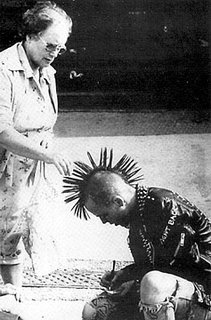What's in a word
 TOLERANCE
TOLERANCE
What's in a word? Well, basically, everything. That's why we get so confused and misunderstood when we only resort to using words to communicate, to interact, to intercourse, to define, to clarify, to edify, to distinguish, to delineate, to fine-tune, to interpolate, to extrapolate, to modify, to classify, to simplify, to say, to hear, to feel, to touch, to love.
What always seems to be missing, corrupted, misconstrued, blurred or unclear is clarity. What often gets misread is misplaced emotion, emphasis, or intention.
My past. Your intent. My agenda. Their goal. Our attention. The metaphor, the simile, the dangling participle. The principle of the principal. The need for 30 different subleties of 'snow' for the Innui people of the north, but only wet-or-dry for the kid with the snowball. The incomplete sentence. The wrong ward.
The context.
The content.
The context.
The reading between the lines.
The repetition. The redundancy.
A word, even with context, is ambiguous at best, misleading at worst, and abused as a matter of course.
Did you ever wonder how the word 'word' was defined in the very first dictionary?
What words did they use before they had words to use?
Did you ever wonder what your first wonderment was?
Have you ever thought about your first thought?
Or someone else's?
Or original thought?
I found myself summoned via subpoena to court a month or so ago as a witness, and had to swear on my oath to "tell the truth, the whole truth, and nothing but the truth". Now, as someone who was raised to value my word (whatever word that is!), it was an impossible predicament I found myself in. Do I lie, and face contempt charges? How could I lie....I swore to tell the truth. The only kid in the whole courtroom who probably had any inkling of "the whole truth" was in the defendant's box......and he wasn't even allowed to speak! It struck me that something was significantly wrong with this picture.
As a bit of a personal aside here, I'm now a retired teacher, having taught many courses for twenty years at the post-secondary level; but having a particularly soft spot for binary, logical problem-solving and some of the various programming languages which came and went over those years. I've watched it grow from its assembler-language based infancy of 1's and 0's (when the first computer I worked on was a mainframe with 4K of main memory) until today, when the entire technology has passed me by so fast I get headaches just watching my head spin. Well, I've been a bit out of sorts as to what to do with the rest of my life lately, and finally settled on the World peace thing. Solve the world problems. Leave it a better place for our kids. Stop pollution. Harmonize religious bigotry and racial hatred. Fix the political systems. All the mundane stuff we put on the bottom of our to-do list after "buy milk, pick up laundry". Shouldn't be too tough, I thought.
Dutifully, I started researching the Internet. In less than half a second it gave me "approximately 255,000,000" hits on the word 'peace'. Now I'm wondering, are there 255 million different interpretations of the word 'peace', or do we already have the ground troops in place, mobilized, and ready to move on a moment's notice?
Or are we going to spend all our time fighting about whose piece of peace is better?
It was about then, I think, that I had my epiphany. My dad always used to ask me, "Rick, why don't you ever have time to do it right, but you always seem to have time to do it over?" (I hated doing homework, and was really slackass about it; thus spending most of my free time the next day in high school in detention hall catching up on stuff I should have done the night before). My Grade 7 teacher, Mr. Pace, wrote on my report card : "Richard is a good student, but has a tendency to jump to conclusions". And my mom, with the patience of Job as I endlessly pestered her with questions about anything and everything when I was young and naive, once kindly and gently asked me one of the most profound questions I think I've ever been asked. She asked me, "Why do you ask so many questions?" These three moments formed a gestalt-like insight for me.
And so I have this theory, see. I'm calling it, for the time being anyway, the Binary Agreement Theory. In its simplest terms, I suppose, it's designed to explain things. Everything.
That probably sounds pretty arrogant. It probably is. But like the judge said to the jury, "Keep an open mind, and withhold your judgement until you've heard all the evidence". Tabla rasa. Send the pink elephants out of the room. Unring all the bells. You know, like OJ's jurors did some years back. Yeah, like that.
Here's the first conundrum I faced about words that I can use:
The theory only makes sense if all words are exempt from generic context; but every word exists only in the presence of consensually understood and accepted specific context. Understand?
In other words, one size fits everything differently. And there are no other words. That will form the basis of the theory's syntax.
Here's my second puzzle:
Every concept, descriptor, idea or thought, whether currently known or not, is (and must be) exactly contradictable. That's just the binary nature of a tertiary world, after all.
The final, and third perplexing challenge of the theory is that it must be universal, with no exceptions; unless, of course, this is contradicted by the second condition I just stated. Otherwise, what's the point?
As an overall challenge to myself, I decided that if it were to make any sense at all, it has to make complete sense. To everyone. Under all conditions. That will be my challenge.
It has to be simple. And do-able. Realistic, and idealistic.
It is based on a single, immutable assumption. It requires tolerance (not necessarily accompanied by acceptance) that every single person is unique and equally worthy.
(The second law let's you challenge this assumption, however).












Post a Comment